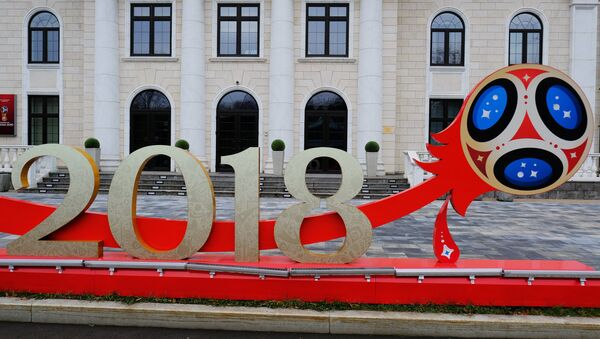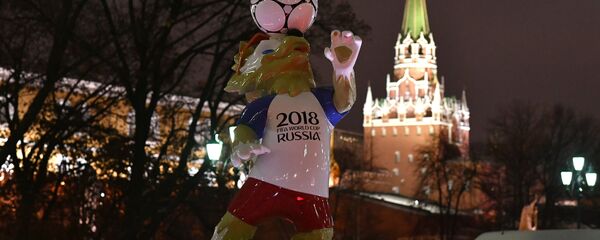Jason White — Russia will host its first FIFA World Cup on June 14 — July 15, 2018. The games will take place in Moscow, St. Petersburg, Kaliningrad, Volgograd, Kazan, Nizhny Novgorod, Samara, Saransk, Rostov-on-Don, Yekaterinburg and Sochi.
Sputnik: What were the main aims of today’s forum and what would you assess as the challenges still remaining that Russia has to overcome with regard to staging the world cup next year?
Konstantin Goryainov: I think Moscow as a city is very much ready for the World Cup in terms of infrastructure, hotels and airports — everything is there, and what we wanted to discuss today with the tourism industry representatives was more about how deep and knowledgeable the dialogue is between Moscow Government representatives and the tour and travel industry representatives, to be mutually beneficial for both parties.
READ MORE: Russian TV Host Responds to Iran's Request to Dress Less Sexy During FIFA Draw
Moreover, what we can get from this particular sporting event that will bring a lot of guests and fans. And what impact we can have after the event itself because it is very important not to have just the month of FIFA World Cup 2018, but also it’s very important to PR the event and cap the attraction of the destination after — this is very important. At the moment Moscow hotels are experiencing a growing demand especially after the recent draw and I think now it is the time not to over exaggerate the anticipation of too many guests coming or of higher prices of hotels, therefore, it should be a common sense approach of holding such an event and accepting guests and welcoming them to Moscow and Russia in terms of comfort and value for money.
🎟️#WORLDCUP TICKETS!
— FIFA World Cup 🏆 (@FIFAWorldCup) December 11, 2017
Random selection draw now open until 31 January 2018 🙌🇷🇺🏆
APPLY HERE👉 https://t.co/8Ymh8z6NcR pic.twitter.com/BhibCviY6J
Sputnik: What about the specific challenge of the language barrier. I think the issue that foreign fans are most concerned about is that of language, you discussed that in the forum today, but specifically the ability of Russians to have the ability to speak both English and Spanish as those are key global languages. Are you confident that every Hotel and Hostel will be able to communicate to guests and fans in English and Spanish but also for the fans to be able to find people or platforms to assist them when they are out travelling around the city and they have problems communicating with Taxi drivers, restaurants or generally find themselves lost or in danger whilst moving around the city.
READ MORE: Final Draw for 2018 FIFA World Cup as it Unfolded (PHOTO, VIDEO)
Konstantin Goryainov: I cannot talk on behalf of other cities but I think Moscow is very much advanced in that respect. I think in Moscow hotels and all branded hotels are bilingual and I know that all front office staff are at least bilingual. In addition, hotels do hire Spanish and Chinese speakers, there are a lot of Chinese travelers coming to Moscow now, to assist their guests and also they do not want to lose face. So with that in mind, everybody wants to be on top of the situation and to have an ability to service their guests at the highest level especially as the prices during the world cup will go up.
Sputnik: Now Konstantin I was interested to hear one of your fellow Guest Speakers mention in one of his responses that Moscow does not hold the same kind of attraction for tourists compared to London or Paris. Why is that still the case in 2017 do you think? Moscow is a beautiful city — architecturally, culturally, historically and it has so much going for it really — but why is it, don’t you think it should be right up there with the likes of London or Paris?
READ MORE: Bavaria's Former Head: Russia 'Will Be Good Host' of 2018 FIFA World Cup
Konstantin Goryainov: I think he was highlighting that Moscow is still primarily a business destination especially for all seasons except the summer period where we have a lot of tourist groups but not individuals, and this is our aim to attract as many individual travelers with touristic intentions and not only business people. I think the main reason is not even the cost of living or the cost of services because Moscow since 2008 is a very competitive city to visit. You can get a decent hotel room now for less than 100 US dollars per night and for you to find a similar level of service and quality in a similar destination in Europe or the States…you cannot find one. Maybe the main reason which is really related to the volume of visitors is visa regulations, because that is the main obstacle and when you have to pay an additional 75 Euros from your own pocket it’s an additional issue and sometimes tourists will consider other East European destinations where they think the experience would be similar, but of course it is not, and we, therefore, have to accept it is reality and therefore have to live with it.
Sputnik: What is your specific hope for the 2018 FIFA World Cup, for it’s not just the draw of the World Cup, it’s what the effect that it will have on Russia and Moscow after the event and the ability to attract and draw travelers and tourists after that, and a strategy of sustainable tourism for the next ten years I would imagine isn’t it?



